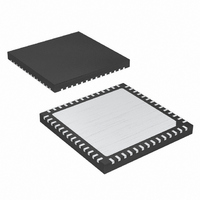MAX19710ETN+T Maxim Integrated Products, MAX19710ETN+T Datasheet - Page 34

MAX19710ETN+T
Manufacturer Part Number
MAX19710ETN+T
Description
IC ANLG FRNT END 56-TQFN
Manufacturer
Maxim Integrated Products
Datasheet
1.MAX19710ETN.pdf
(37 pages)
Specifications of MAX19710ETN+T
Number Of Bits
10
Number Of Channels
2
Power (watts)
30mW
Voltage - Supply, Analog
3V
Voltage - Supply, Digital
3V
Package / Case
56-TQFN Exposed Pad
Lead Free Status / RoHS Status
Lead free / RoHS Compliant
10-Bit, 7.5Msps, Full-Duplex
Analog Front-End
components to the Nyquist frequency excluding the
fundamental and the DC offset.
ENOB specifies the dynamic performance of an ADC at a
specific input frequency and sampling rate. An ideal
ADC’s error consists of quantization noise only. ENOB for
a full-scale sinusoidal input waveform is computed from:
THD is typically the ratio of the RMS sum of the first five
harmonics of the input signal to the fundamental itself.
This is expressed as:
where V
the amplitudes of the 2nd- through 6th-order harmonics.
HD3 is defined as the ratio of the RMS value of the third
harmonic component to the fundamental input signal.
SFDR is the ratio expressed in decibels of the RMS
amplitude of the fundamental (maximum signal compo-
nent) to the RMS value of the next-largest spurious
component, excluding DC offset.
IMD is the total power of the intermodulation products
relative to the total input power when two tones, f
and f
products are (f
± f
are at -7dBFS.
IM3 is the power of the worst 3rd-order intermodulation
product relative to the input power of either input tone
when two tones, f
The 3rd-order intermodulation products are (2 x f
f
are at-7dBFS.
34
34
IN2
IN2
), (2
______________________________________________________________________________________
______________________________________________________________________________________
IN2
THD
), (2
, are present at the inputs. The intermodulation
1
✕
is the fundamental amplitude and V
✕
f
=
IN2
MAX19710
MAX19711
MAX19712
MAX19713
f
ENOB = (SINAD - 1.76) / 6.02
IN2
20 x log
PART
Spurious-Free Dynamic Range (SFDR)
IN1
± f
± f
IN1
IN1
± f
IN1
Effective Number of Bits (ENOB)
and f
Third Harmonic Distortion (HD3)
Intermodulation Distortion (IMD)
Total Harmonic Distortion (THD)
IN2
). The individual input tone levels
⎡
⎢
⎢
⎣
3rd-Order Intermodulation (IM3)
). The individual input tone levels
(V + V + V + V + V )
), (2
2
IN2
2
✕
, are present at the inputs.
3
2
f
IN1
V
), (2
1
4
2
SAMPLING RATE (Msps)
✕
5
2
f
IN2
), (2
6
2
2
–V
⎤
⎥
⎥
⎦
7.5
11
22
45
✕
6
IN1
f
are
IN1
IN1
±
Power-supply rejection is defined as the shift in offset
and gain error when the power supply is changed ±5%.
A small -20dBFS analog input signal is applied to an
ADC in such a way that the signal’s slew rate does not
limit the ADC’s performance. The input frequency is
then swept up to the point where the amplitude of the
digitized conversion result has decreased by 3dB. Note
that the T/H performance is usually the limiting factor
for the small-signal input bandwidth.
A large -0.5dBFS analog input signal is applied to an
ADC, and the input frequency is swept up to the point
where the amplitude of the digitized conversion result
has decreased by 3dB. This point is defined as the full-
power bandwidth frequency.
THD is the ratio of the RMS sum of the output harmonics
up to the Nyquist frequency divided by the fundamental:
where V
V
up to the Nyquist frequency.
Spurious-free dynamic range (SFDR) is the ratio of RMS
amplitude of the fundamental (maximum signal compo-
nent) to the RMS value of the next-largest distortion
component up to the Nyquist frequency excluding DC.
n
are the amplitudes of the 2nd through nth harmonic
THD
1
DAC Dynamic Parameter Definitions
is the fundamental amplitude and V
=
20 x log
INTEGRATED CDMA Tx FILTERS
Spurious-Free Dynamic Range
⎡
⎢
⎢
⎣
(V + V + ...+ V )
2
Total Harmonic Distortion
2
Power-Supply Rejection
Small-Signal Bandwidth
Yes
No
No
No
Selector Guide
Full-Power Bandwidth
3
2
V
1
n
2
⎤
⎥
⎥
⎦
2
through








